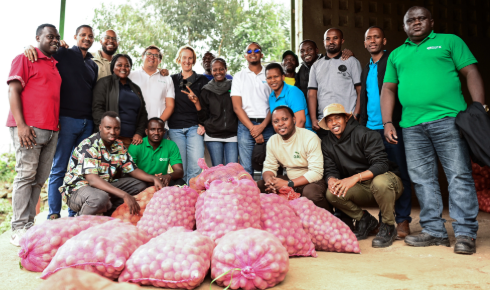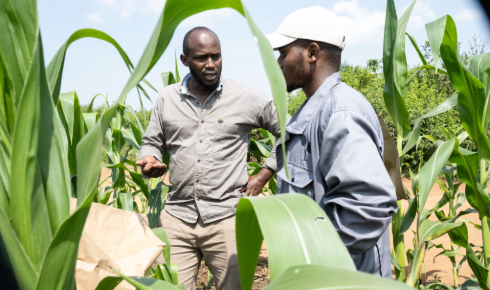My Lab Unlocked: Dr Joseph Moughan FRSB of the RICA Seed Center

Dr Joseph Moughan FRSB on working with food security crops in Rwanda
The RICA Seed Center was launched in 2022 and our mission is to provide world-class seed R&D, training and services to strengthen Rwanda’s seed sector. We’ve already supported more than one million smallholder farming households to access quality seed and run a successful professional certificate in Seed Technology and Business. We work with the major food security crops such as: maize (corn), potato, rice, wheat, beans (bush & climbing) and soybean.
At the RICA Seed Center, we focus more on fieldwork than lab work, though we do have a lab as well for studying plant pathogens and seed viability. Our research supports smallholder farmers to access high-performing crop varieties that help them adapt to climate change, resist pests and diseases, and grow more nutritious food. The work is guided by what farmers need most and involves improving access to seed varieties that work well under local conditions.
 Research has helped improve access to seed varieties that work well in local conditions
Research has helped improve access to seed varieties that work well in local conditions
Climate change is the biggest challenge we face. Rainfall patterns are no longer predictable – rains arrive too early or too late, and sometimes in extreme bursts. This unpredictability leads to both drought and soil erosion. Farmers also face growing threats from pests and diseases that have the potential to appear more suddenly and spread faster. Addressing these interconnected challenges requires faster breeding cycles, better data, and close engagement with farmers on the ground, where the real action is happening; in the fields where our food is grown.
Creating and disseminating new crop varieties requires blending agroecology, genetics, seed quality testing, field trials, and increasingly, AI and bioinformatics. for this reason, we take a multidisciplinary approach with many national and international partners. Beyond science, we work directly with smallholders to ensure our seed varieties fit their farming systems and preferences such as taste, cooking times, and appearance of the crop. Our facilities include a dedicated seed quality lab, national trial sites, and infrastructure for parent seed production and toll-based processing and specialist storage (cold warehousing and diffused light stores)—all designed to serve Rwanda’s emerging seed companies.
I’ve always been passionate about biology. I studied biology at the University of Manchester, and a formative year at the National Botanic Garden of Wales helped me connect conservation and agriculture. I then pursued a PhD at Rothamsted Research and the University of Exeter, funded by Syngenta Seeds UK, where I explored how genetics and farm practices can control disease and promote increased agricultural productivity. I later joined One Acre Fund to apply that knowledge to support smallholder farmers, eventually founding the RICA Seed Center.
This journey has allowed me to come full-circle and I’m proud that I get to apply biology via agriculture and conservation every day to solve one of the world's greatest challenges today: how do we grow enough food, in the right places, when the climate is changing and the natural world in which humans rely on to survive in is under the greatest pressure we’ve ever known?
 The RICA Seed Centre works with major food security crops such as potatoes
The RICA Seed Centre works with major food security crops such as potatoes
In terms of decisions about my career, I followed curiosity—choosing topics and opportunities that felt meaningful. Shifting away from medical research to food systems felt obvious when I started thinking about how much biology is involved in food production and how many global issues tie back to food—health, conservation, and equity. I encourage all students to get as many working opportunities and internships as possible – knowledge and qualifications are good, but experience is key.
While my path has always centred on biology, I’ve pivoted often—moving from conservation to agriculture, from big industrial agriculture to smallholder-focused systems. Every experience you get will teach you a lot, one of my most surprising beneficial experiences was working as a labourer for my father, an electrician on large industrial building sites. This felt unrelated to biology when I was an undergraduate, but helped hugely later in life while we built seed processing facilities in Rwanda. All experiences add up. I now work at the intersection of conservation and agriculture—my ideal blend.
 Seed Quality Laboratory Senior Specialist Claire Habiyambere inspects germination
Seed Quality Laboratory Senior Specialist Claire Habiyambere inspects germination
In terms of getting to where I am today, there have been several important steps. These include working hard to get into the right university; taking a year out after my A-Levels when my direction didn’t feel quite right; taking a year in industry, which opened my eyes to real research; reading and talking widely beyond my field; holding part-time jobs that taught me how to work hard and with kindness, and saying yes to unusual opportunities, even if they didn’t seem like part of a plan.
If early career researchers want a similar career path, I would advise them to pursue their passion—even if it feels unfashionable to say that these days. I truly believe passion keeps you driven on the boring or difficult days. Network widely, including with people outside your field (networking is really just friendship – it doesn’t need to be corporate and aggressive). Be bold: apply for things even if you don’t feel 100% qualified. Try lots of different things. And most importantly: fail, learn, and keep going. And try to have some fun and not take yourself too seriously!
 Head of seed enterprise Dr Saidi Rumanzi teaches breeding techniques to a trainee
Head of seed enterprise Dr Saidi Rumanzi teaches breeding techniques to a trainee
When it comes to collaborations, I’m especially interested in partnerships that accelerate the release of crop varieties that solve real-world problems for smallholder farmers in culturally relevant ways. This includes collaborative trials, data-driven trait selection, and rapid seed multiplication and placement.
The RICA Seed Center is fully financially supported by the Howard G. Buffett Foundation. It is a partnership between One Acre Fund, the Rwanda Institute for Conservation Agriculture (RICA), and the Rwandan Ministry of Agriculture and Animal Resources. We are deeply grateful for the vision and commitment of these institutions in strengthening Rwanda’s seed sector.
Dr Joseph Moughan FRSB is Director of the RICA Seed Center, a hands-on centre of excellence that provides B2B services to help Rwandan seed companies


